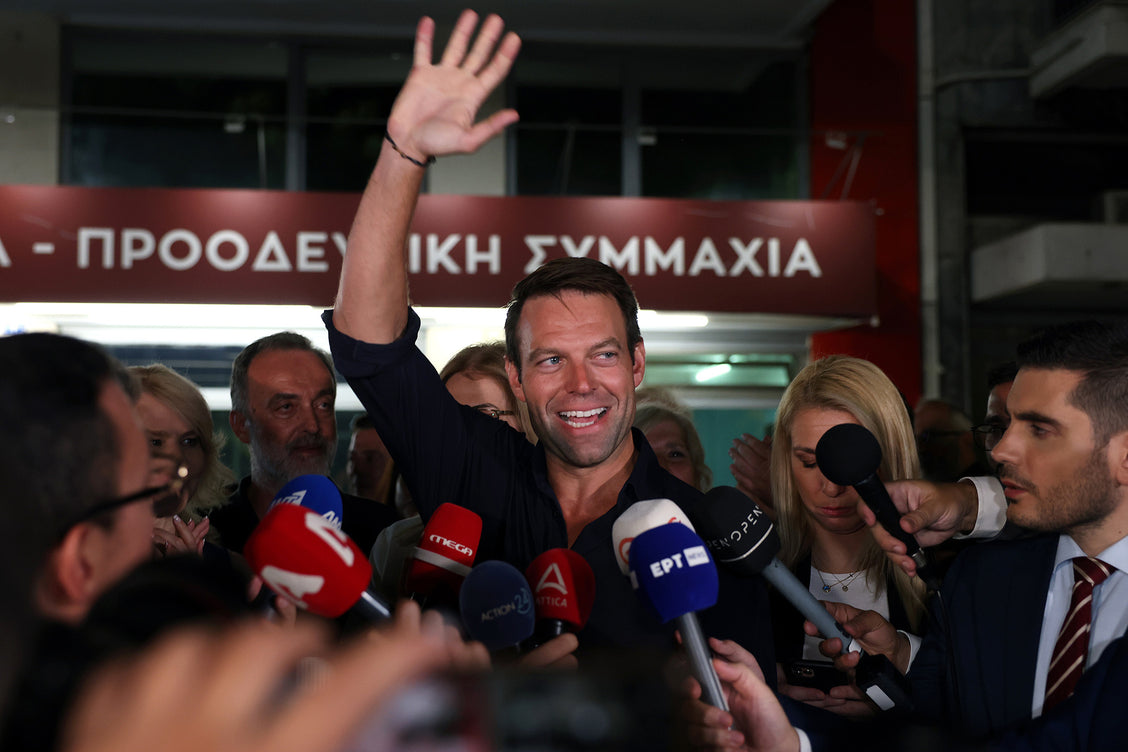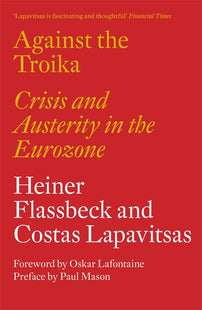The Death of the Greek Left: A Political Tragedy
Stefanos Kasselakis's victory in the SYRIZA leadership contest marks a traumatic break from the party's political traditions, raising the question: where goes the Greek left go from here?

Expectations for SYRIZA’s recent leadership contest were high. The early favourite among the party's radical-left to take the helm of the current Greek parliamentary opposition, a party that holds 47 out of the 300 seats in the Hellenic Parliament, was Effie Achtsioglou, a 38-year-old Member of Parliament and former minister. She seemed poised to steer SYRIZA into a new era that would have signified a return to the party’s traditional ideological foundations. Possessing a doctoral degree in Law and a robust knowledge of labour markets, Achtsioglou boasted an understanding of Greek policymaking the envy of even seasoned political veterans.
Instead, and against all odds, Stefanos Kasselakis, a political newcomer who made his political debut following the general election of June 2023, secured victory in the September 24 contest garnering an impressive 56.69% of the vote. Kasselakis, a 35-year-old businessman, is notable for being Greece's first (openly) gay party leader, and he is married to Tyler McBeth, an emergency room nurse from the United States. Often referred to as "the golden boy," due to his previous experience in investment banking at Goldman Sachs, Kasselakis resided in the United States until the spring of this year. His rapid ascent has raised questions about his political acumen and his familiarity with the intricacies of the nation he is now tasked the opposition for.
Significantly, in the June general election, SYRIZA received the backing of some 920,000 citizens. However, in the subsequent leadership contest, participation dwindled markedly; only 132,710 individuals taking part. Notably, SYRIZA's central committee extended the voting eligibility to include new members, provided they completed their registration before the election day. In the aggregate, Kasselakis secured 74,285 votes, less than 10% of the Syriza voters who actively engaged in the June election.
What was particularly intriguing about the leadership contest was the marked contrast in its tone before the emergence of Kasselakis and after. Before he joined the contest, the forerunner Achtsioglou diligently formulated a progressive left-wing agenda for the future of SYRIZA. Her campaign championed a robust welfare state, advocated for heightened transparency in politics, and would have been particularly beneficial to Greece’s many low-income families. Additionally, she espoused a green agenda aimed at addressing Mediterranean climate change, proposed a raising of the minimum wage, a critical reassessment of the current austerity measures, and a renewed emphasis on human rights.
However, a shift occurred with the arrival of Kasselakis. A brigade of fervent Kasselakis supporters was unleashed who waged a vicious online campaign replete with baseless accusations that Achtsioglou had sabotaged former leader Alexis Tsipras, as well as disinformation, and misogynistic attacks against Achtsioglou. This carefully series of orchestrated attacks not only altered the tone of the discourse but ultimately tipped the scales in favour of the eventual winner.
Within the inner sanctum of SYRIZA’s leadership, a pervasive sense of scepticism took root, largely down to Kasselakis’ campaign, which was centred on the twin arts of communication and optics. Regrettably, substantive discussions of politics were largely absent from the proceedings. Kasselakis, in evading the task of elucidating his political agenda, rendered it difficult to evaluate his vision for the party’s future.
Kasselakis’s catapult to prominence was instead largely down to his relentless emphasis on the metapolitical elements of his persona. His public appearances took the form of leisurely strolls with his partner, daily visits to the gym, or shared moments with his dog on the couch. And the political enigma of his approach was accentuated by his absence from debates and his reluctance to engage with journalists, all of which have raised critical questions about the transparency and accountability of his leadership challenge.
[book-strip index="1"]
Of course, political newcomers can often breathe new life into a party, but with Kasselakis failing from the outset to articulate the ideological underpinnings of his leadership and his modus operandi for steering the party, there are grave doubts about the form this could take. What is of paramount significance, however, is the serious challenges SYRIZA faces. The absence of a strong and potent left opposition during a period in Greek politics characterized by environmental catastrophe, allegations of political corruption within the government of Kyriakos Mitsotakis, and the ascendance of far-right extremism will be deeply concerning for many Greeks.
***
Rather than fostering unity, the SYRIZA's new leadership has only accentuated the deep internal conflicts in the party, conflicts that have the potential to precipitate a further ideological schism. Such splits are not uncommon in politics, and often serve as a means of political survival. The key though, usually lies in long-term strategic planning. SYRIZA's failure to pivot decisively toward a clearly defined left-wing agenda to counter New Democracy's expanding neoliberalism represents a moral lapse that may haunt the party for years to come.
This internal strife, however, is not unique to SYRIZA. It reflects a broader trend in left-wing parties across Europe. The Labour Party under Keir Starmer, for instance, has charted a centrist course, and has made moves towards the embracing of nativist politics with calls for stricter border controls. Similarly, the Social Democratic Party (SPD) in Germany has witnessed a debilitating collapse under Olaf Scholz, marked by ideological ambivalence and confusion. In the midst of these developments, SYRIZA finds itself grappling with similar challenges, addressing the concerns of left-wing voters and navigating a complex political landscape.
As Syriza’s MPs anxiously await some clarity on the party's future direction, there are valuable insights to be gained from the experiences of left-wing parties in Italy and Spain, which have demonstrated the potential for unity, either by effectively mobilizing voters or by steadfastly adhering to ideological principles and carefully selecting candidates, exemplified by experienced yet fresh figures like Elly Schlein, the recently elected secretary of Italy’s Democratic Party.
However, there is the pressing concern of immature leadership, a phenomenon that can be exacerbated by an audience lacking in political sophistication. In a time of dire necessity, SYRIZA's base, or what remains of it, has chosen to rally behind an enigmatic figure devoid of any discernible agenda, beset by a dubious past, and shrouded in uncertainty regarding his qualifications (with allegations that his CV may be embellished). Reports from Athens have highlighted the negligible association of Kasselakis with leftist ideologies. Notably, his conspicuous absence from rallies or political campaigns was a noteworthy phenomenon before March 2023. During this period, his contributions to the New York-based Greek diaspora newspaper National Herald showed a consistent admiration for the sitting conservative prime minister Kyriakos Mitsotakis and an endorsement of his policies.
One notable deficiency of Kasselakis’s leadership campaign was the absence of unity in the party, a void that has, as previously noted, been underscored by the behaviour of his supporters. In the absence of political maturity and a steadfast commitment to core values, it is difficult to see how SYRIZA can hope to survive a second political death, following the earlier demise in 2015. Indeed, some may even say that this is the party's third death, considering the seismic upheaval triggered within the party by Alexis Tsipras' resignation in June.
[book-strip index="2"]
In the event of a political schism within SYRIZA, the repercussions may prove to be more profound than those experienced in 2015, when the radical-left faction, comprising Yanis Varoufakis, Costas Lapavitsas, and Zoe Konstantopoulou among others, left the party in protest at Tsipras' decision to sign a new memorandum with the European Union. A new schism at this juncture has the potential to create a rupture of unparalleled magnitude, effectively cleaving the traditional left-wing faction of the party from the emerging movement spearheaded by Kasselakis. This movement, supported by an amalgam of former PASOK members, centrist advisors, and a contingent of (former) right-wing members of New Democracy, could represent the definitive separation of paths.
The very same party that once championed an anti-European course, asserting that it would annul the memoranda with a “single legislative act”, a pledge Alexis Tsipras himself made, has now faded into the annals of history. The opacity of SYRIZA's current trajectory appears ominous and disquieting, especially when one considers the party's apparent failure to acknowledge the broader contextual factors at play.
***
The presence of two other left-wing political parties within the Hellenic Parliament stands as a potential counterbalance to the gaps that SYRIZA, under the leadership of Kasselakis, may create. Nonetheless, PASOK's historical association with extravagant government spending and rampant systemic corruption during the 1980s remains a contentious issue among voters who yearn for a fresh, more pragmatic alternative. Under its current leader, Nikos Androulakis, PASOK has aligned itself with the sitting conservative government on several occasions, thus raising doubts about its status as a socialist movement.
Also enigmatic is the Communist Party of Greece, KKE. A topic deserving of extended analysis, KKE's presence in Greek politics largely retains a purely symbolic role, designed to evoke memories of the grim events of the Civil War of the late 1940s and the enduring struggle of Greek communists under state coercion, a political persecution that continued until the emergence of Andreas Papandreou in 1981. There’s little doubt that the KKE serves as a poignant reminder of this tragic episode. However, since the 1990s, it has been an ideologically challenged entity, bereft of moral compass, displaying strong homophobic tendencies, and frequently abstaining from significant debates within the Hellenic Parliament. This absence has allowed New Democracy to navigate unfettered in the past four years, encountering minimal resistance. Perhaps, under its current leader, Dimitris Koutsoumpas, any support for KKE will remain symbolic rather than political. But the question remains: could KKE ever transition to an active participant in Greek politics?
[book-strip index="3"]
SYRIZA's role thus remains pivotal in steering the Greek left towards forward, a Herculean task for Kasselakis. Seemingly unperturbed, he addressed his supporters on Sunday, September 24th, advocating for a "patriotic left"—a rather nebulous concept—and asserting that the days of right-wing dominance in Greece are drawing to a close. Enthralled by these vague and vacuous statements, his supporters chanted: "there he is, there he is, the new PM.”
***
One cannot overlook the spectre of the previous leadership, and the lingering shadow of Alexis Tsipras. Following his resignation in June this year, his legacy, punctuated by the effort that propelled SYRIZA into its inaugural governmental position—albeit within a coalition government with the far-right Independent Greeks—should have served as a guiding light for the party's stability in the aftermath of his departure. Yet, as his erstwhile comrades, including Achtsioglou, grappled with relentless assaults by the newcomer, rendering the leadership contest a crucible of toxicity and internecine discord, Tsipras chose the path of silence. Over the past three months, he has remained in the shadows, seemingly awaiting an improbable turn of fate.
The truth is that Alexis Tsipras failed to elevate the political destiny of the left above his own personal survival. His management of the leadership transition, marked by an unsettling absence of charisma in the twilight of his tenure, has cast him as someone who, despite his defeat in three successive general elections, lingers as SYRIZA’s sole torchbearer. The fact that Kasselakis is seen as someone who can continue Tsipras’s legacy, even after the latter's repeated electoral setbacks and his stubborn refusal to recede from the forefront of the political stage, speaks volumes about the party's current predicament.
Authentic political leadership is often characterized by introspection and a willingness to acknowledge one's shortcomings. Above all, it must embrace change and champion innovative approaches. These principles, which should have charted the course for SYRIZA over the past 15 years, have been notably absent. Instead, the old guard clings to the reins, refusing to relinquish power and make room for those committed to preserving the party's left-wing legacy and preventing its derailment.
Reflecting on the legendary CBS interview featuring former PASOK leader Andreas Papandreou and William F. Buckley Jr. in April 1972 serves as a stark reminder of what a genuine Greek left-wing agenda once embodied during times of profound crisis. Papandreou's words resonated with the force of truth, addressing matters of the force majeure loophole, navigating the complexities of Turkish provocations, criticising NATO, and promising to lend an ear to rural Greece—a population that was at the time seeking to decentralize the political apparatus and infuse fresh vitality into the realm of left-wing politics.
Alexis Tsipras once harboured aspirations of emulating Papandreou, endeavouring to adopt similar socialist positions at a time when Greece yearned for a bona fide leader to reposition the left and imbue it with renewed purpose. The political denouement of Tsipras' leadership aligns eerily with the recent tumultuous events of the past month. Now, the final flicker of hope for the revival of left-wing ideals is held in the hands of a former Goldman Sachs banker, devoid of political experience, who envisions shaping an agenda only after assuming the helm. What this agenda entails remains an enigma, yet the sands of time are slipping away for SYRIZA.
Georgios Samaras is an Assistant Professor of Public Policy at King’s College London.






